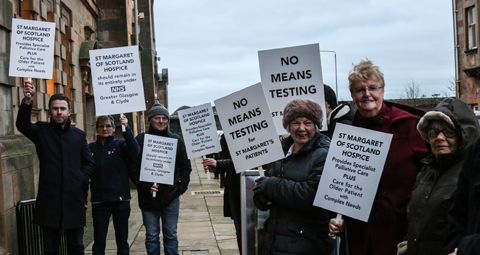BY Daniel Harkins | January 27 | ![]() 0 COMMENTS
0 COMMENTS ![]() print
print

Protesters spell out backing for threatened Catholic hospice
CROWDS came to Clydebank Town Hall last week to show their support for Scotland’s only Catholic hospice. St Margaret of Scotland Hospice faces an unsure future after new funding rules and the possible introduction of means testing put its charitable status at risk
Clutching placards and equipped with a determination to support the great work of the Sisters of Charity, Catholics joined those of other faiths and none in protesting outside and inside the town hall on January 18.
“I am more than aware of how deeply loved the hospice is and how, since 1950, the hospice has been at the heart of the Clydebank and wider community,” Sr Rita Dawson, chief executive of the hospice, said. “Thank you all most sincerely for coming out to show your support.”
Inside the town hall, West Dunbartonshire Council gave unanimous support for the hospice. All political parties united in order to support a motion by Councillor Denis Agnew.
“This council agrees to commit to support St Margaret of Scotland Hospice in its endeavours to retain its charitable status and not be placed in a situation whereby future patients will be means tested,” the motion read.
“This council further believes the hospice should be recognised as a stand-alone centre of excellence, and that the 28 beds for patients with complex medical needs at St Margaret of Scotland Hospice should continue to be funded by Greater Glasgow and Clyde Health Board and not be subject to Integrated Joint Board funding decisions.”
Following the cross-party vote, Provost Douglas McAllister said some issues transcended politics. “The council of West Dunbartonshire and the people of West Dunbartonshire, we can all go forward united behind one campaign,” he said.
“The hospice will not be accepting this and there will be no means testing at St Margaret of Scotland Hospice.”
A spokeswoman for St Margaret’s said the hospice ‘has always been and remains open to all in need of care.’
“Means testing of any of our patients is inconsistent with the ethos and core values of the hospice. The support of the council is of tremendous assistance to the hospice’s mission to care for all who need it including the elderly with complex medical and nursing needs.”
The hospice is the largest in the country, with 58 beds for palliative care and care of the older adults with complex medical and nursing needs.
Uniquely among hospices in Scotland, St Margaret’s provides medical beds in addition to palliative care. However, changes mean the Greater Glasgow health board could reclassify these as care beds. As a result, the hospice would be funded by a new body responsible for the funding of care homes, and people using its services could be means tested to see if they could afford to contribute to the costs.
A Scottish Government spokesperson said: “St Margaret of Scotland Hospice provides a valued service to the people of West Dunbartonshire, Glasgow City and East Dunbartonshire.
“It is for local health and social care partnerships (HSCPs) to commission palliative care services to meet needs in their area, but St Margaret’s will not be required to charge anyone directly, as the eligibility assessment will be undertaken by local authority staff under the direction of the HSCP. West Dunbartonshire HSCP is clear there is nothing in these new arrangements to undermine St Margaret’s charitable status.
“The Scottish Government would urge St Margaret’s to continue to discuss these issues with the HSCP.”
—This story ran in full in the January 27 edition print of the SCO, available in parishes.











